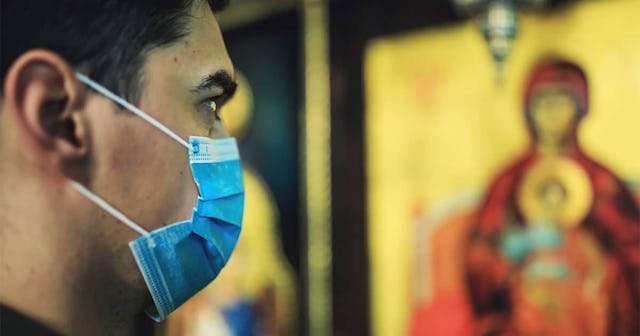Religious Institutions Are Defying Safety Precautions and Endangering Their Congregations

As COVID-19 infects more Americans and the Center for Disease Control (CDC) and medical experts call for social distancing and prohibiting large groups of people from congregating in order to slow the rate of infections, many religious institutions have scoffed at these recommendations, rebuking science and refusing to close services and protect their congregations.
COVID-19 and the seasonal flu have some overlapping symptoms, but COVID-19 is not “just like the flu.” COVID-19 spreads faster, is deadlier than influenza and is also highly transmittable, particularly when an infected person is still pre-symptomatic.
While the majority of patients have mild to moderate symptoms and will recover, 20% of COVID-19 patients require hospitalizations, which is ten times higher than the flu. In the U.S., influenza kills approximately 1 in a thousand people, but COVID-19 is currently estimated to kill at least 10 people per thousand infected.
Social distancing is one of the most effective ways to “flatten the curve” and prevent the virus from spreading, especially to those at higher risk. The CDC currently recommends events should be limited to no more than ten people.
There are many churches that have taken the necessary steps to protect their congregations (and others that will be forced to close their services due to some states now limiting large gatherings and issuing a shelter- in-place order) but there are still religious institutions that are resisting social distancing, even as the number of infected Americans and the death toll rises.
RAUL ARBOLEDA/Getty
Pastor Tony Spell of the Life Tabernacle Church in Louisiana repeatedly boasted that he will not comply with social distancing—calling it “dictator law” and has continued to hold services for large groups of people, some of these services had over 1,000 people—prompting a visit last week from the local police for defying the Governor’s order prohibiting gatherings of 50 or more.
Rodney Howard-Browne, a pastor in Florida, also refused to close services and brazenly cheered for church members to shake hands, stating that his church is not a bunch of “pansies.” Both pastors have close ties to Trump and have reportedly not faced any pressure from the administration to close services.
This past weekend, many churches around the country still held services. Around 200 people packed into mass in Virginia at the Basilica of St. Mary’s church on Sunday, far past the recommendations of the CDC.
Many congregants that won’t practice social distancing do so out of a refusal to change their weekly routine. Marvin Moone a member of the Zion Baptist Church in Northwest D.C. stated, “I’m just going to go along with my life the way I’ve always done and not be afraid. If I get it, I hope I don’t die.”
But the problem is even if someone wants to take a risk with their own health, refusing to take the recommended precautions put many others who are at risk in more danger.
And the problem is not just in the U.S. In Brazil, a major evangelical church just won a court battle to stay open, with their pastor, Silas Malafia, calling the virus “a fantasy.”
Retailers known for their religious connections have also bucked the recommendations of experts and refused to close. Currently, Hobby Lobby — whose evangelical owners are known for their bigoted anti-LGBTQ stance — refuse to close their 900 locations in the U.S. Instead, they reported that they will sanitize surfaces and that “God will guide us through this storm.”
Joe Raedle/Getty
Bartow County in Georgia is now dealing with an outbreak of cases tied to a church event on March 1st. This outbreak also led to the death of one congregation member. While some of the recommendations on social distancing were not as widespread when this event took place, if events like these continue, the problem will only intensify.
And even when some religious institutions did take steps and closed services and different events, many of those precautions do not go far enough. Shelly Angelo, a member of the Latter-day Saints church, reports that “keeping Temples open for live ordinances anywhere, letting the missionaries out as long as they did, and actively encouraging members around the world to pass Sacrament to other members, breaks the recommended protocol of social distancing.”
Of course people can be exposed to the virus in multiple settings, not just religious institutions, but when religious leaders openly defy government orders and CDC recommendations— and even encourage large gatherings — they are endangering the welfare of the very people they claim to want to protect.
The consequences of refusing to practice social distancing can be deadly and religious leaders need to take action. Religious doctrine often calls on its congregants to “love thy neighbor” and take care of our community. “Different churches have stayed open for different reasons. All of them need to suspend in-person events if they love their neighbors,” stated Nathan Empsall, an Episcopal priest in Connecticut.
To refuse to act during a pandemic goes against what is best for the community. The best way to “love thy neighbor” during this global health crisis is to stay home, so we can all help another neighbor stay alive.
This article was originally published on